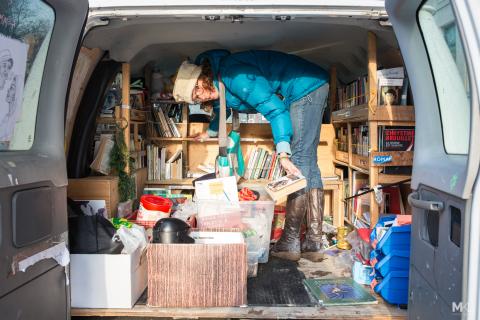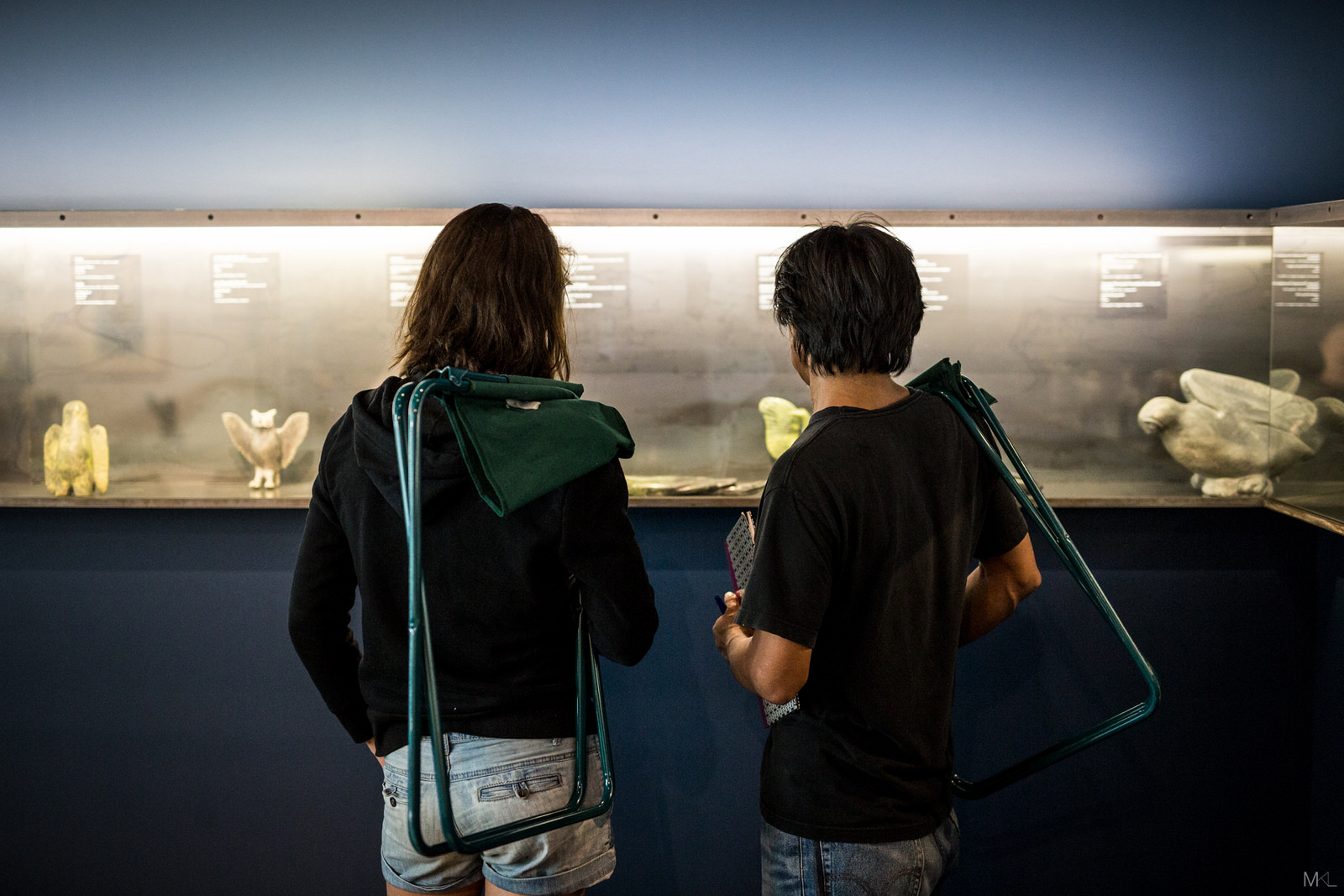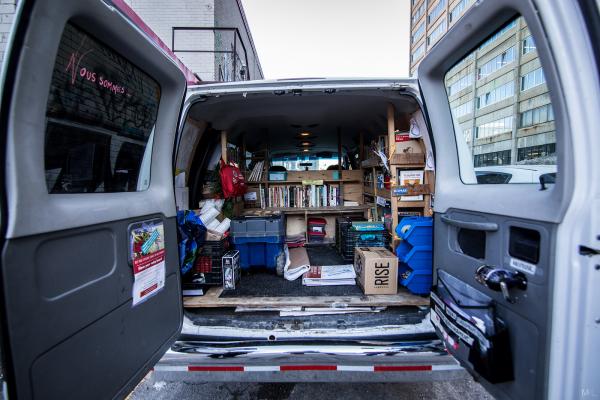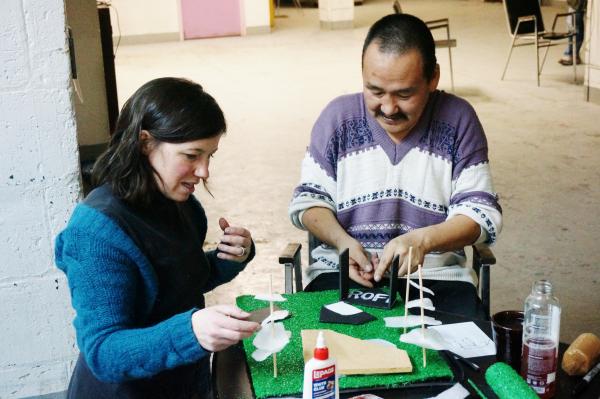Submitted by admin on
Par Noémie Maignien
Photo de couverture: Mikael Theimer
Il y a quelques jours, j’étais en sortie avec la van d’idAction Mobile, la fameuse caravane philosophique d’Exeko qui se promène dans les rues à la rencontre des personnes en situation d’itinérance, mais pas que, et dont l’objectif est de créer des temps d’échanges spontanés entre tous les usagers de la rue - quel qu’en soit l’usage -, et de les inviter à la réflexion et à la créativité.

 La van lors d'une sortie idAction Mobile (photo : Mikael Theimer)
La van lors d'une sortie idAction Mobile (photo : Mikael Theimer)
Les premières fois que j’ai accompagné les médiateurs et médiatrices dans la van, j’étais pleine de curiosité et d’appréhension : venant du milieu de la médiation culturelle, j’ai été amenée à m’adresser à une diversité de personnes, enfants, adultes, francophones, étrangers, des amateurs de musées, des personnes qui n’y ont jamais mis les pieds, des mécènes, des personnes en sortie avec des organismes communautaires, etc. J’ai toujours valorisé les moments de partage où chacun va mettre des mots et échanger sur son émotion ou son interprétation d’une oeuvre, et où collectivement, médiateur et public ensemble, nous construisons un savoir qui n’est pas académique mais composé de nos découvertes et connaissances personnelles, un apprentissage qui souvent nous marque parce qu’expérientiel.
Mais j’avais plutôt l’habitude de travailler dans un cadre institutionnel, entre les murs d’un musée. Et là, pas de murs, pas de toit, pas vraiment de support (dans le sens où l’objectif n’est pas de transmettre des connaissances précises sur des oeuvres exposées), seulement la rue.
Les sorties idAction Mobile se font en compagnie d’un médiateur et de bénévoles, et souvent les supports pour engager la réflexion et à la créativité sont les livres et le matériel créatif que nous proposons. J’étais donc outillée et accompagnée, mais pas certaine de comment m’adresser aux personnes que j’allais rencontrer, et surtout, quels allaient être mes repères dans cet espace protéiforme, mouvant et non-familier qu’est la rue.
 L'intérieur de la van (photo : Mikael Theimer)
L'intérieur de la van (photo : Mikael Theimer)
Dans la rue, espace social mais pas forcément de sociabilité, espace impersonnel, souvent de passage, j’ai été surprise de voir comme on tendait à recréer des murs virtuels : des murs intérieurs, entre les gens qui se sentent différents, sont embarrassés les uns des autres, s’ignorent et s’excluent. Des murs extérieurs, aussi, en recréant des espaces, dédiés, fonctionnels, voire intimes. Pour certains, la rue n’est pas un espace de passage, mais un espace où rester, où vivre, et qui parfois tentent de le rendre moins impersonnel.
Par exemple, à la rencontre d’un groupe de personnes sur une place, probablement en situation d'itinérance, on avait été accueilli(e)s poliment, mais avec un peu d’impatience, comme si l’on dérangeait. La médiatrice m’avait alors dit : “Je les comprends, moi non plus ça me plairait pas d’être dérangée constamment et par n’importe qui dans mon salon, même si cette personne vient avec de bonnes intentions.”
Une participante autochtone rencontrée dans la rue il y a quelques mois, m’a dessiné la maison de ses aïeux, dans sa communauté natale. Je lui ai dessiné la maison en pierre dans laquelle j’ai grandi en France.
On m’a dit un jour que l’espace avec les tables de pique-nique du square Viger avait été baptisé la “cuisine” par les personnes vivant dans le parc.
 Suzanne Doucet durant Espace de Rêve (photo : Dorothée De Collasson)
Suzanne Doucet durant Espace de Rêve (photo : Dorothée De Collasson)
À l’hiver dernier, Exeko exposait les créations de participants de refuges représentant en maquettes poétiques de leur chez-soi idéal, dans le cadre de la résidence artistique Espace de rêve. J’étais surprise de voir autant de leurs projets où l’espace intérieur et extérieur se mélangeaient.
Cet été, une autre résidence dans le cadre de Métissages Urbains menée par Marie-Claude De Souza, a recensé auprès de personnes en situation d’exclusion ou non, les petits noms donnés familièrement aux lieux-dits, lieux que l’on fréquente régulièrement, et que l’on s’approprie en les rebaptisant. Ultimement, Marie-Claude réalisera une carte poétique, à la fois singulière et commune, de ces lieux renommés. Pour plus d'informations je vous conseille de faire un tour sur le site internet du projet : topoesie.com.
Autant d’exemples qui questionnent la façon de penser, projeter ou représenter un espace familier, voire intime, un chez soi. Qui mettent en lumière la porosité entre l’espace public et l’espace privé. Qui soulignent parfois le privilège que peut être la vie privée. Qui invitent à prendre soin des espaces publics.
Ce projet est rendu possible en partie grâce au soutien de l'Oeuvre Léger. Merci à eux !











 Laurier
Laurier